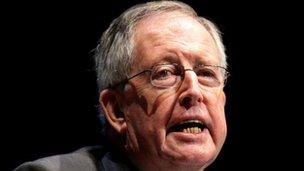Information law scrutiny means worries on both sides
- Published
- comments

Lord McNally says all parties will have the chance to make their case
The Freedom of Information Act is about to go through a process known in Whitehall jargon as 'post-legislative scrutiny' or, in other words, examining how it is working in practice.
This procedure will take some time but could have a crucial impact on the future development of freedom of information in the UK. It seems to have left some FOI campaigners worried about how the Act might be scaled back and some public bodies and private companies worried about how it may be further extended.
At a seminar, external yesterday the justice minister Tom McNally said, external some government colleagues were not keen on the Act being subject to this, but he had pushed it through. He insisted it will give both proponents and critics of FOI the chance to make their case.
The Ministry of Justice is working on a report it plans to submit before Christmas to the Commons Justice Committee, which will then consider what other evidence to take.
'Tension within government'
The MoJ has also commissioned some research into the financial cost of FOI for public authorities, but this is not expected to be completed until the new year.
The trade-off between costs and benefits will clearly be one important element in the scrutiny process. The deputy information commissioner Graham Smith told the same seminar that he was worried that FOI work might suffer disproportionately in an era of public spending cuts, a fear that many FOI officers share, external.
Lord McNally acknowledged there was "a tension within government" on how much to extend, external freedom of information to private sector bodies, although he added that the split was not along party lines.
'Goldmine of intrusion'
He justified the decision to give many communications with the Royal Family an absolute exemption from FOI, while emphasizing it was a cabinet decision
"It's one of those rough and ready decisions where you try to marry political reality with principle", he said. "Leaving the monarchy within the FOI Act would be a goldmine of intrusion for journalists."
Lord McNally insisted that his personal enthusiasm for FOI had not been undermined by his experiences as a minister, although he recounted an anecdote that suggested some of his colleagues might be following Tony Blair down the path of disillusion.
When he recently informed a meeting of fellow Lib Dem ministers that he had just extended FOI to a number of additional bodies such as the Association of Chief Police Officers, they replied "What did you want to do that for?" But perhaps this was just a joke.